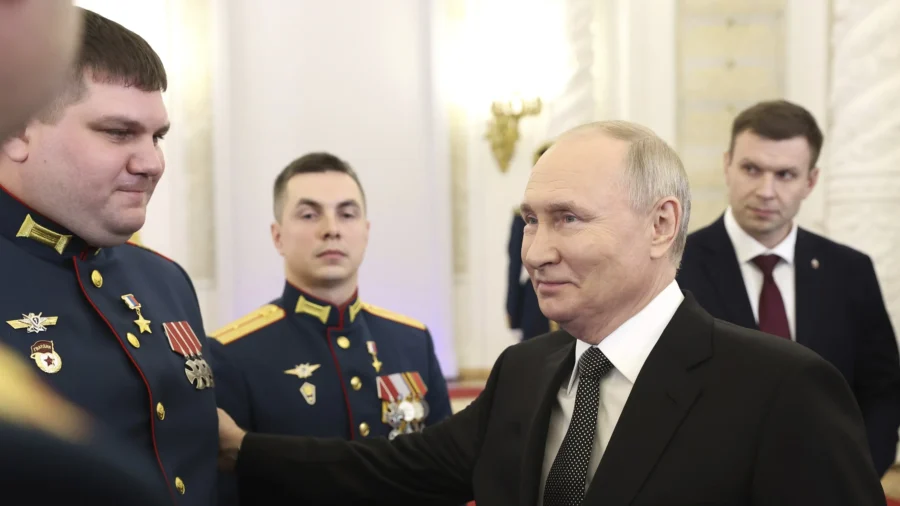Russian President Vladimir Putin has confirmed he will run in presidential elections slated to be held in March of next year.
Mr. Putin, who made the announcement at an award ceremony for veterans of the ongoing conflict in Ukraine, will be seeking a fifth term as Russia’s leader.
“I have had different thoughts at different times, but now it’s time to make a decision,” he said, answering a question posed by a decorated combat veteran.
“I believe there is no other option,” he added in comments broadcast on national television.
“That’s why I plan to run for the position of president,” Mr. Putin confirmed at the military ceremony, held at the Kremlin’s Georgievsky Hall on Dec. 8.
A victory in the upcoming poll would allow the longstanding leader, who first became president in 1999, to remain in power until 2030.
A day before his surprise announcement, Russia’s Federation Council (the upper house of parliament) voted to hold the election on March 17 of next year.
“With this decision, the electoral cycle has effectively begun,” Council Chairwoman Valentina Matviyenko said after the motion was adopted unanimously.
According to the Federation Council, which is responsible for setting election dates, the winner of the upcoming poll will be formally inaugurated in May.
As of yet, no other Russian political personalities have announced plans to contest the election.
According to official Russian sources, Mr. Putin enjoys broad public support, with approval ratings typically topping 80 percent.
The Epoch Times could not independently verify Mr. Putin’s approval ratings, which his critics—both at home and abroad—say are exaggerated.
Putin Eyes 5th Term
Mr. Putin, 71, was first appointed acting president by Boris Yeltsin on the final day of 1999.
Mr. Yeltsin, the country’s first post-Soviet leader, served as Russia’s president from 1991 to 1999, when he appointed Mr. Putin as his successor.
In 2000, Mr. Putin won a presidential election with 53 percent of the vote. He handily won a 2004 reelection bid with 71 percent of all votes cast.
Dmitry Medvedev then assumed the presidency after winning a 2008 presidential poll, while Mr. Putin assumed the post of prime minister.
A close Putin ally, Mr. Medvedev currently serves as the deputy head of Russia’s Security Council.
Mr. Putin returned to the presidency in 2012 after winning almost 64 percent of the vote.
The next election was held in 2018 after a constitutional amendment extended the length of the president’s term from four to six years.
Mr. Putin also won that election—beating out seven other candidates—with almost 77 percent of the vote.
Pavel Grudinin, the candidate for Russia’s Communist Party, came in second with just shy of 13 percent.
According to official sources, total voter turnout stood at 67.5 percent.
Following the 2018 poll, the Organization for Security and Cooperation in Europe (OSCE)’s human rights mission stated that candidates had been able to “campaign freely.”
Nevertheless, it added, “the extensive and uncritical coverage of the incumbent [Mr. Putin] in most media resulted in an uneven playing field.”
Russia’s population currently stands at some 145 million, approximately 110 million of which are eligible to cast ballots.
In 2020, the constitution was again amended to allow elected presidents to serve for more than two terms in a row.
Annexed Regions to Vote
According to Ms. Matviyenko, residents of Donetsk, Luhansk, Kherson, and Zaporizhzhya will take part—for the first time—in the upcoming poll.
“By choosing a head of state together, we fully share the common responsibility and common destiny of our fatherland,” Ms. Matviyenko said.
Last September, Russia effectively annexed the four Ukrainian regions and now considers them Russian Federation territory.
The move followed referendums held in all four regions, in which a majority of residents voted to join Russia, according to Russian and pro-Russian sources.
Ukraine and its Western allies, for their part, reject the legitimacy of the referendums and view the annexations by Russia as illegal and unprovoked land grabs.
With the support of most Western capitals, Kyiv has vowed to recover the four lost regions by force of arms.
Kyiv and its Western allies also demand the return of the Crimean Peninsula, which Russia effectively annexed in 2014 following a similar referendum.
Russian forces invaded eastern Ukraine in February of last year. They remain in control of most of the four recently annexed regions, as well as Crimea.
While much of the West portrays Mr. Putin as a dictator and war criminal, his approval rating has continued to rise—officially at least—despite his ongoing invasion of eastern Ukraine.
Reuters contributed to this report.
From The Epoch Times

